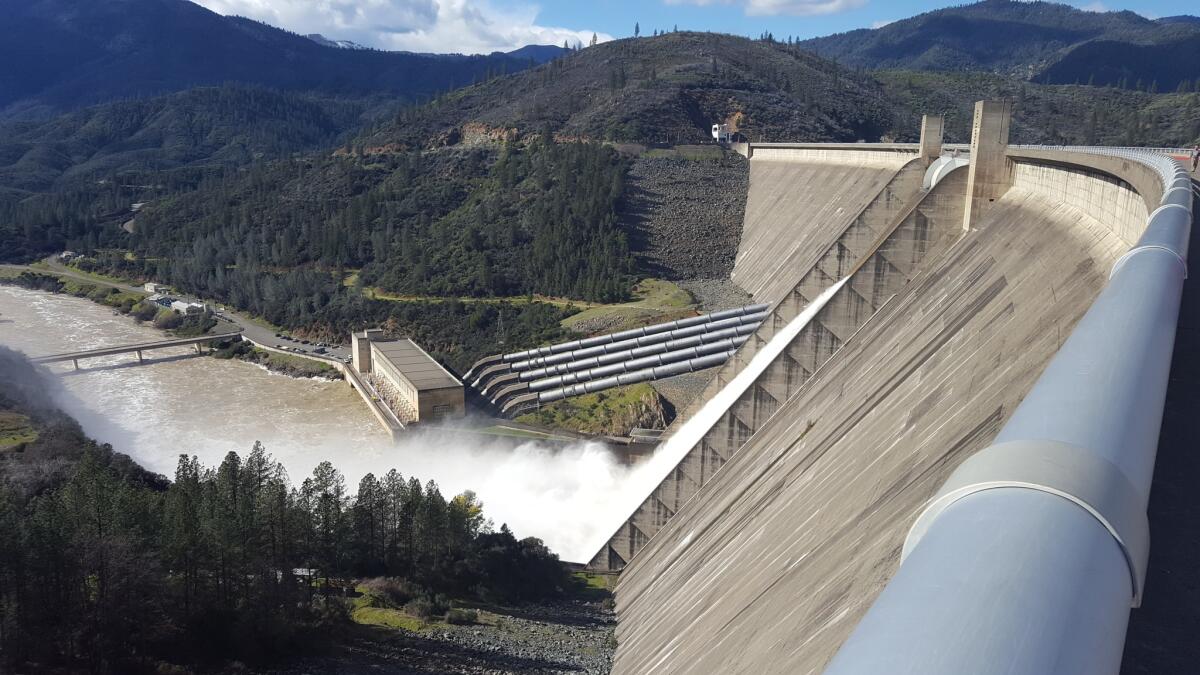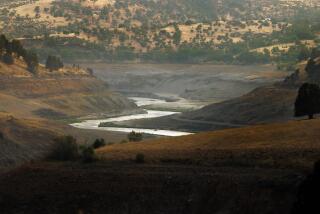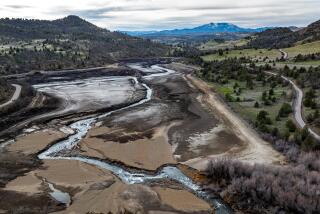Shasta Dam makes history as water flows from top gates for first time in 20 years
Reporting from Lake Shasta, Calif. — While California’s other major dam has been the focus of national attention, the Shasta Dam was making history itself this week.
For the first time in almost two decades, water was released Wednesday from the topmost gates of the dam impounding Lake Shasta, California’s largest reservoir, marking another milestone in what is shaping up to be the state’s wettest year on record.
The release lasted just 15 minutes and was only a test to confirm that the gates were functioning properly in case they need to be used at a later time, according to the U.S. Bureau of Reclamation. The gates operated as expected, bureau spokesman Louis Moore said.
With the reservoir at 135% of its historical average for this time of year and nearly 93% of its capacity, dam engineers were releasing billions of gallons of water to make room for incoming flows from the Cascade Range and distant Sierra Nevada foothills, according to the bureau.
Water was flowing from the reservoir at up to 70,000 cubic feet per second into the Sacramento River, and communities downstream were preparing for a corresponding surge along its banks.
Shasta Dam is the linchpin of California’s federal water project, which sends water down to cities and farms to the south. Oroville Dam is the heart of a separate state water project, which also moves water from the Sierra Nevada south.
Oroville was at the center of a major crisis when an emergency spillway showed signs of failing, prompting the evacuation of more than 100,000 residents downstream. Since then, officials have lowered water levels at Lake Oroville and the concerns have eased.
There have been no issues with the spillways at the Shasta Dam, though officials downstream have been talking about contingencies in the unlikely event that significantly more water needs to be released from it.
This week marked the first time the agency has used the gates at the top of the 602-foot-tall dam about 120 miles from the Oregon border in far Northern California since the state’s last huge rainy season in 1997-98.
A set of valves lower down on the dam were used for the first time in six years in January, which was a precursor to Wednesday’s milestone.
To illustrate just how much rain has fallen on Northern California this year, Moore said, the reservoir held only 2.67 million acre-feet of water at this point last year.
As of midnight Wednesday, he said, the reservoir was holding 4.21 million acre-feet.
An acre-foot of water is enough to supply the needs of a family of five for a year, Moore said.
In February alone, the reservoir has added 669,000 acre-feet of water, or a year’s supply for more than 3.3 million people, he said.
“It’s ridiculous,” Moore said.
Lake Shasta has risen 3 feet in just the last three days, he said.
“Think of the vast size of the reservoir,” Moore said. “That’s a tremendous amount of water.”
Even for locals, the dam has something new to offer.
Daniel Botts, 21, from Redding, was in awe of just how much water the lake held after more than five years of drought.
He pointed to where the lake meets the concrete dam. “It used to be you could look over the edge and it’d be a death drop,” he said.
Now it’s more of a high dive.
Alice Hightower, 91, remembers the last time Redding, downriver from the lake, flooded.
It was 1940 and there was no dam to prevent an onslaught from rain or snowmelt.
“We lost seven cows downriver,” she said Thursday, during one of her routine visits to the site.
Her husband, Thomas, helped build the enormous structure.
“Something with sledgehammers and concrete,” she chuckled.
Back then, residents moved out of Redding, fearing the dam wouldn’t last.
Now it’s a tourist attraction.

“They say it’ll last thousands of years because it’s all cement,” Hightower’s daughter Darla Hoeft said.
The two came to gawk at the waterfall gushing from the dam, which draws regular visitors on rare sunny days.
“It’s an amazing dam, you got to admit!” Redding resident Sally Batchelder said proudly. “We haven’t had this much rain and snow since the ’80s.”
The gates have been used only twice in more than a generation, in 1983 and 1997, bureau officials said.
They might have to be used again later this year for snowmelt, Moore said.
The snowpack in the Sierra Nevada is at levels never seen before, and when it melts in the spring and summer, it will likely send a massive flow of water into the lake.
In Tehama, about 50 miles downstream from the dam, Mayor Robert Mitchell didn’t sound too concerned about the releases from the reservoir flooding homes along the Sacramento River in his city.
On Thursday morning, the river was full and moving fast, but well within its banks.
“In summertime it’s a beautiful river with clean water. Right now it’s kind of ugly, muddy and raging,” the mayor said.
The influx of water from the reservoir hasn’t been a concern because it has been controlled, Mitchell said. But the reservoir being so full and the dam gates having to be used at all suggest bigger problems could be on the horizon.
It hasn’t flooded here since the 1997-98 El Niño, said Mitchell, a Tehama resident for the last 45 years.
“My biggest concern, and just about everyone agrees with it, is with all the snowpack in the Sierra. If we get a warm rain this spring we’re going to be flooded. There’s no getting around it,” Mitchell said. “It’ll be ugly down here, but there’s nothing you can do to stop it. Nature will play its role and whatever happens happens.”
For breaking California news, follow @JosephSerna on Twitter.
ALSO
Sen. Kamala Harris to visit Oroville Dam as work continues on damaged spillways
Hit by worst floods in a century, San Jose got little warning of impending disaster
UPDATES:
6:25 p.m.: This article was updated with more information on Oroville.
4:30 p.m.: This article was updated with comments from Santa County residents.
This article was originally published at 1:25 p.m.
More to Read
Sign up for Essential California
The most important California stories and recommendations in your inbox every morning.
You may occasionally receive promotional content from the Los Angeles Times.











